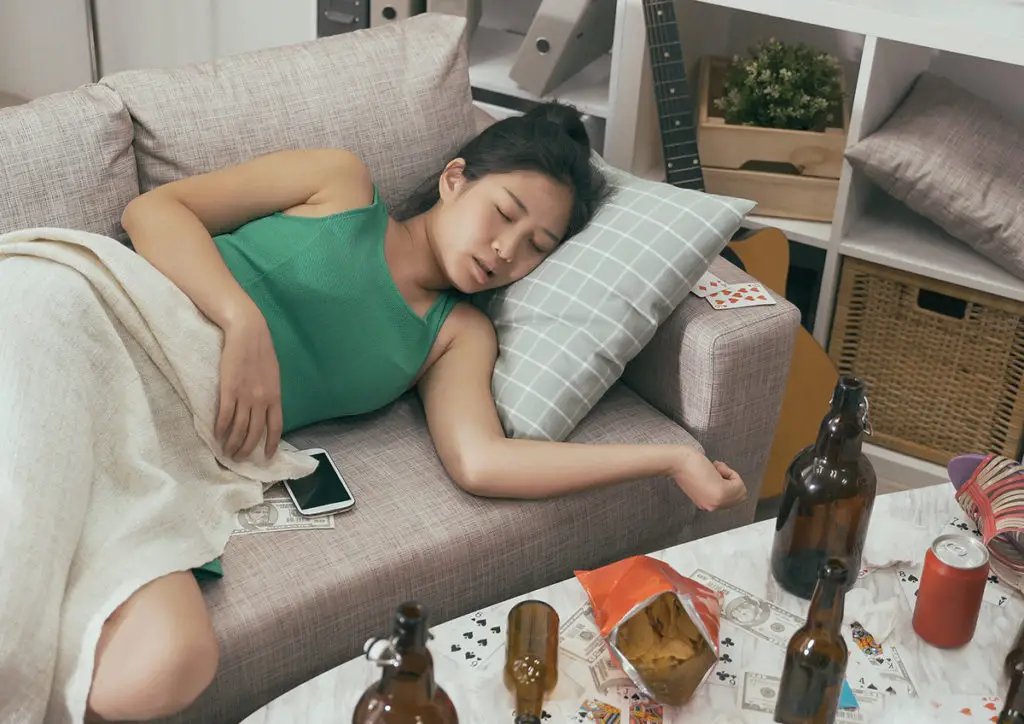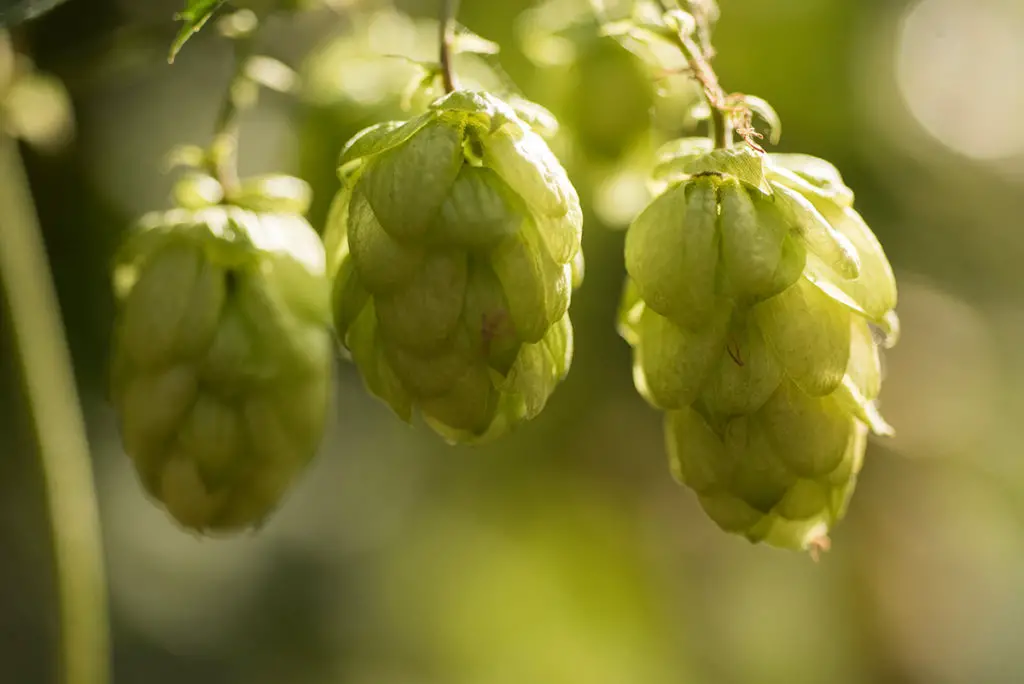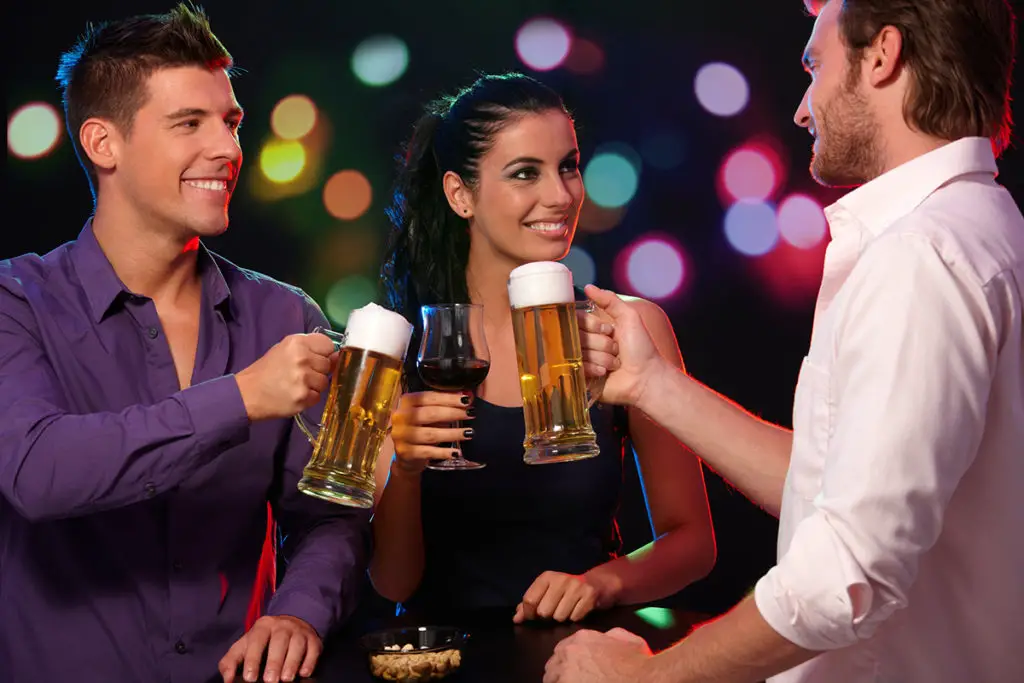For most people, beer is an accepted part of their weekend routine. After a long week of work, it’s only natural that you choose to unwind with friends with a pint of beer in your hand. However, the issue lies with what happens next – many people report feeling drowsy as the night goes on. So, why does drinking beer make you feel sleepy?
Beer makes you sleepy for two reasons – the alcohol content and the hops. Alcohol is a depressant and drinking results in enhanced feelings of relaxation and drowsiness. Additionally, hops are a natural soporific that kickstarts your body’s sleep process in several ways.
In this article, I’ll explain how these ingredients bring about sleep in further detail and offer tips on avoiding feeling drowsy when you drink beer.
Beer, Alcohol, and Sleep
Most people attribute the sleep-inducing qualities of beer to its alcohol content, and that’s definitely one part of the equation. It’s also the reason that other alcoholic beverages can lull you to sleep as well.
But why does alcohol cause sleep?

BEER DROP: Boxes of beer from Award-winning microbreweries → Join The Club
The simple answer is that alcohol is a depressant. It acts upon your central nervous system, acting as a sedative. It affects your brain chemistry, making you feel relaxed and drowsy.
Alcohol works by acting on the protein molecules in your brain. Specifically, it targets proteins known as GABA-A receptors.
These proteins are found on 80% of all neurons in your brain, so the alcohol you drink has a significant effect.
So, why is the fact that alcohol targets GABA-A receptors significant?
When alcohol isn’t present in your bloodstream, the receptors are where the neurotransmitter GABA is sent. When GABA reaches the receptors, it binds to them, opening a channel.
This channel allows GABA to prompt chloride ions to move from the neurotransmitter to the neuron it’s bound to.
Once chloride ions enter your neurons, they slow down neuron functions, making you relaxed and sleepy. This effect is enhanced by introducing alcohol to your bloodstream, which leads to you feeling sleepier faster.
The Effect of Beer and Alcohol on Sleep During the Night
It should be noted that alcohol only makes you feel sleepy at the start of the night.
The easiest way to understand this is to think back to the last time you fell asleep after consuming a few drinks. More than likely, your first few hours of sleep after hitting the bed were great – you probably didn’t wake up much (or at all) and had a relatively comfortable first half of the night.
However, a few hours into sleeping after drinking beer or alcohol, everything changes.
Let’s go back to the GABA-A receptors we discussed above. At the start of the night, these receptors are affected by alcohol, which makes you fall asleep. However, alcohol’s effect on your GABA-A receptors wears off within a couple of hours of drinking (usually 4 to 5 hours).
When the effect of alcohol wears off, the receptors change position inside your brain. Usually, they’re located on the surface of your neurons. Once alcohol stops working on them, they move inside your neurons – and once they’re inside your neurons, they can’t be activated, even when GABA reaches and bonds to them.
This means that chloride ions no longer enter your neurons – and they go back to working fast again. More than just returning to normal activity, they actually start working faster than usual, resulting in you waking up, often before your body has the sleep it needs.
After the first couple of hours, alcohol actually leads to worse sleep, and you’re more likely to wake up frequently through the rest of the night. Other effects on your sleep quality include:
- Less REM Sleep: REM sleep is the deepest part of your sleep cycle where you start to dream. Research indicates that alcohol leads to lower quality REM sleep, and this is part of why you feel groggy and unfocused when you wake up the following day.
- Disrupted Dreams: When you dream after consuming alcohol, you’re more likely to have extremely vivid dreams/nightmares. Some people also report higher instances of sleepwalking after drinking.
It should be noted that, for most people, this effect is only temporary. Your body can synthesize new GABA-A receptors a few hours after they move inside your neurons, so it’s unlikely that your sleep will be affected over the long term.
(However, the situation is different for people who struggle with alcohol addiction. Their GABA-A receptors react to alcohol differently from how they react in social drinkers.)
Hops and Sleep
Here’s a relatively unscientific experiment you can try the next few times you’re out with your friends – stick to drinking only one type of alcohol all night, and rate:
- How sleepy you feel
- The quality of your sleep that night
People often find they feel sleepier – and sleep better – after drinking beer versus other alcohols. In fact, if you’ve ever tried non-alcoholic beer, you’ll find that there’s a good chance you feel sleepy after drinking it – and since it’s non-alcoholic, there’s no chance that it’s the alcohol content causing your drowsiness.
These reports are ultimately anecdotal – but is there any actual scientific evidence that backs them up?
As it turns out, there is.
One of the main ingredients in beer is hops. Hops are essentially the flowers of the plant Humulus lupulus. Inside each flower (also known as a hop cone) is a yellow, naturally-occurring substance known as lupulin.

Hops are added to beer for their lupulin content. This yellow substance helps develop both the flavor and the smell of beer – specifically, it gives your beer the bitterness needed to balance out the sweetness of the malt.
However, aside from giving your drink its signature taste and smell, hops are also commonly used as a natural soporific or sleep-inducer. Folk healers have long prescribed it as a way to treat a host of issues, including:
- Anxiety
- Restlessness
- Nervousness
- Most importantly, insomnia
The brewing process doesn’t affect the soporific quality of the hop plant, which is why beer makes you feel sleepier in comparison to other alcohols.
The sleep promotion quality of hops isn’t merely a folk superstition – there’s some scientific evidence that backs it up. One study showed that university students who drank non-alcoholic beers made with hops also reported increased sleep quality.
A second study was conducted on female nurses who worked night shifts and again showed that drinking non-alcoholic beer with hops resulted in higher sleepiness across several parameters. Additionally, they also reported reduced anxiety levels, supporting the basis behind the folk prescription of hops for anxiety concerns.
As both studies mentioned above were conducted using non-alcoholic beers, we can conclude that it’s the hops in the beer rather than the alcohol that affected the sleep of the study participants. In alcoholic beers, alcohol and hops together result in you feeling sleepier than you would after drinking the same quantity of another alcohol.
Hops function similarly to alcohol in making you feel sleepy – that is, they enhance the function of the GABA-A receptors in your brain. However, it should be noted that they don’t have the same side effects after a few hours as alcohol does, which is why you don’t feel hungover after drinking non-alcoholic beer.
Aside from affecting your brain chemistry, hops also affect your body temperature, lowering it after consumption. Lower body temperature is one of the signs that your body is entering the sleep cycle, which again makes you feel drowsy after consuming hops.
Drinking Beer Without Feeling Sleepy
If you’re drinking beer with friends, there’s a good chance you’re not interested in feeling sleepy – instead, you want to stay awake long enough to enjoy your time with them.

Luckily, there are a few steps you can take to avoid feeling sleepy after a glass or two of beer, including:
- Avoid beers that have a high ABV. The more alcohol, the sleepier you’ll feel – and the converse is true as well, so less alcohol means you’ll feel less sleepy.
- Avoid hoppy beers. Like with alcohol, the more hops in a beer, the sleepier you’ll feel. Avoiding hoppy beers like IPAs and pilsners will help you avoid feeling sleepy after finishing your drink.
- Drink in moderation. Even low-alcohol, less hoppy beers will make you feel sleepy if you drink too much, as the effect of the alcohol and hops will essentially be cumulative. Keeping things to a couple of beers will reduce the risk of you wanting to hit the bed partway through your night out.
- Don’t drink on an empty stomach. If you haven’t had time to grab a bite yet, order something at the bar. Having something non-alcoholic in your stomach will help reduce the speed at which alcohol affects you.
- Stay active. Move around, talk to people, and dance if others are dancing as well. Staying in one place, lying down, or closing your eyes can help speed up how quickly you feel sleepy because of the psychological effect of these actions. When you’re not doing anything, and your body’s already feeling the soporific effects of the beer, your brain will think it’s time to go to bed, and you’ll feel sleepier.
Final Thoughts
The soporific effect of beers is due to a combination of their alcohol content and the hops used in the brewing process. That’s also why non-alcoholic hoppy beers will make you sleepy despite having no alcohol.
It’s possible to stave off the sleep-inducing effects of beer. You’ll need to choose your beer carefully (opt for low alcohol, non-hoppy options), drink in moderation, make sure you eat something and stay as active as possible through the night until you’re ready to sleep.
